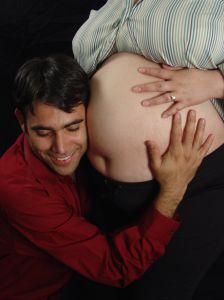By Rita Brhel, managing editor and attachment parenting resource leader (API)
 Pregnancy is an amazing time of bonding between a mother and her baby, especially during a first pregnancy. There is no way to describe what hearing the heartbeat or feeling a movement for the first time feels like. Watching her belly grow and grow, the months pass by, perhaps an ultrasound or two giving a glimpse into the womb, and then the transformative power of labor and childbirth – pregnancy is an amazing journey for a new mother.
Pregnancy is an amazing time of bonding between a mother and her baby, especially during a first pregnancy. There is no way to describe what hearing the heartbeat or feeling a movement for the first time feels like. Watching her belly grow and grow, the months pass by, perhaps an ultrasound or two giving a glimpse into the womb, and then the transformative power of labor and childbirth – pregnancy is an amazing journey for a new mother.
And for a new father, as he watches his unborn child’s mother’s belly grow, places his hand on her belly, and gets to feel a kick here and there. Childbirth is just as transformative for the father. At one moment, the baby is little more than a dream and, the next, the baby is here! Birth is a joyful event, but it can also be confusing for a new father. He doesn’t have the hormonal drive to attach to the new baby like the mother has, and with so much of the mother’s time wrapped up with caring for the baby, the father can feel a little lost in his role at first.
There are a number of ways fathers can connect with the new baby after birth. What works in a lot of families is asking the father to take on a certain baby care task, such as giving baths, supporting the breastfeeding mother, or filling bottles. But, even then, it can take a while for the father to feel a special connection with this new family member who, at first, only seems to take more and more energy and time without giving much in return.
Fathers who concentrate on bonding with their baby in utero may be able to make the adjustment to fatherhood after the baby’s birth a little easier. Here are a few tips for fathers:
- Become informed – Read up on pregnancy, childbirth, and baby care. Talk to other fathers. The more informed you are, the more comfortable you’ll feel. It’s also good to develop a support system of fathers, too, to call upon should you need some help relating to your spouse or partner during pregnancy or adjusting to changes after the baby comes.
- Attend prenatal appointments – Hearing the heartbeat and seeing the ultrasound helps make the pregnancy feel more real, especially in the early months when the only outward signs may be a nauseated, tired, and moody mother. It’s also a great way to show support to your partner.
- Feel for kicks – A couple weeks after the mother starts to feel the baby move, you will be able to, too. Some babies will kick if you put your hand on the belly. Even if you don’t catch every kick, you can gently push on the belly to find a foot or head or bottom or back. Or, you can watch your partner’s belly ripple as the baby turns around inside.
- Talk or sing to the baby – Even in the womb, your baby can hear your voice and react. Once your baby is born, she will be able to differentiate your voice from her mother’s and from others’ voices.
- Support your partner – Help your partner deal with the physical challenges and emotional ups-and-downs of pregnancy. The mother’s stress can adversely affect the baby’s development and the health of the pregnancy, so by keeping Mom calm, you’re doing a very loving act for both her and your baby.
- Say “I love you” – Bonding with your unborn baby is partially having the faith to go ahead and fall in love with your baby, even though you cannot yet see and hold him. By initiating an emotional connection without getting anything in return, you’ll be ready for the first few hard months when caring for the baby is all-consuming.
What tips do you have for fathers looking to begin the bonding process with their unborn child?
Bonding for us did during pregnancy. Not completely naturally, though, but somewhat intentionally. I was very ill during my pregnancy with my son, but we began the bonding process by regularly reading a week-by-week development book. It is truly amazing to track the miracle that is taking place. It was great for my husband, and it really made a difference for me even after birth.